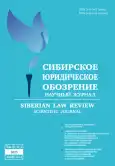Тактико-криминалистические особенности производства освидетельствования при проверке сообщений о преступлениях
- Авторы: Анешева А.Т.1, Тимошенко С.Е.2, Шеховцова Л.С.3
-
Учреждения:
- Омская академия МВД России
- Сибирский юридический университет
- Московский университет МВД России имени В. Я. Кикотя
- Выпуск: Том 22, № 2 (2025)
- Страницы: 271-281
- Раздел: УГОЛОВНО-ПРАВОВЫЕ НАУКИ
- Статья опубликована: 07.07.2025
- URL: https://journal-vniispk.ru/2658-7602/article/view/343639
- DOI: https://doi.org/10.19073/2658-7602-2025-22-2-271-281
- EDN: https://elibrary.ru/EQNBRG
- ID: 343639
Цитировать
Полный текст
Аннотация
Одним из видов осмотра законодатель называет освидетельствование, суть которого состоит в осмотре тела живого человека. Данное следственное действие является важным инструментом в процессе получения доказательств как на стадии предварительного расследования, так и на стадии возбуждения уголовного дела. Специфика проверки сообщения о преступлении состоит в ограниченном количестве следственных действий, производство которых разрешено законодателем на этой стадии уголовного судопроизводства. В этой связи возрастает ценность каждого из следственных действий, ввиду присущих им уникальных и индивидуальных целей и задач. Освидетельствование относится к категории следственных действий, производство которых возможно на стадии возбуждения уголовного дела, в связи с чем авторы раскрывают тактические особенности его производства в рамках проверки сообщения о преступлении. В статье рассмотрены актуальные вопросы проведения освидетельствования, исследован процессуальный порядок данного следственного действия, определен круг его участников. Перечислены возможные процессуальные статусы участников освидетельствования, проводимого до принятия решения о возбуждении уголовного дела, то есть лиц с неопределенным процессуальным статусом. Авторами исследован вопрос обеспечения прав и законных интересов данных лиц при проведении в отношении них освидетельствования. На основании анализа правоприменительной практики сформулированы ситуации проведения освидетельствования на стадии возбуждения уголовного дела по преступлениям, связанным с незаконным оборотом наркотических средств и психотропных веществ, причинением легкого вреда здоровью либо не причинившим легкого вреда здоровью, а также совершенным в сфере безопасности дорожного движения и эксплуатации транспорта. С учетом целей и задач исследуемого следственного действия авторами рассмотрены тактико-криминалистические особенности производства освидетельствования на подготовительном, рабочем и заключительных его этапах. По результатам анализа судебно-следственной практики, а также действующего законодательства сформулирован алгоритм действий следователя по производству освидетельствования на стадии возбуждения уголовного дела. Проведенное исследование, а также научно-обоснованные рекомендации относительно тактики производства освидетельствования в ходе проверки сообщения о преступлении в полной мере раскрывают возможности данного следственного действия и обеспечивают его популяризацию в правоприменительной деятельности.
Об авторах
Амина Тулегеновна Анешева
Омская академия МВД России
Автор, ответственный за переписку.
Email: b.ami08@mail.ru
ORCID iD: 0009-0001-2558-794X
доцент кафедры криминалистики, кандидат юридических наук, доцент
Россия, пр. Комарова, 7, Омск, 644092Светлана Евгеньевна Тимошенко
Сибирский юридический университет
Email: svet73-13@mail.ru
ORCID iD: 0000-0002-4369-8686
доцент кафедры уголовного права и процесса, кандидат юридических наук, доцент
Россия, ул. Короленко, 12, Омск, 644010Любовь Сергеевна Шеховцова
Московский университет МВД России имени В. Я. Кикотя
Email: l.sheh@mail.ru
ORCID iD: 0009-0009-1639-7608
доцент кафедры криминалистики, кандидат юридических наук
Россия, ул. Академика Волгина, 12, Москва, 117997Список литературы
- 1. Виницкий Л. В. Освидетельствование на предварительном следствии. Смоленск : Смоленск. гуманит. ун-т, 1997. 76 с.
- 2. Тетюев С. В. Участие специалиста в следственных действиях, сопровождающихся обнажением // Российский юридический журнал. 2024. № 4 (157). С. 101-111. https://doi.org/10.34076/20713797_2024_4_101
- 3. Верещагина А. Субъекты стадии возбуждения уголовного дела // Уголовное право. 2008. № 6. С. 35-39.
- 4. Белозеров Ю. Н., Марфицин П. Г. Обеспечение прав и законных интересов личности в стадии возбуждения уголовного дела. М. : Учеб.-метод. центр при глав. управлении кадров МВД РФ, 1994. 76 с.
- 5. Миронова А. В. Заявитель и очевидец как участники уголовного судопроизводства с неопределенным процессуальным статусом // Вестник Московского университета МВД России. 2015. № 9. С. 84-87.
- 6. Гриценко Т. В., Кравцов С. С. Уголовное преследование в стадии возбуждения уголовного дела и процессуальный статус участников данной стадии: проблемные аспекты // Вестник юридического факультета Южного федерального университета. 2023. Т. 10, № 4. С. 67-74. https://doi.org/10.18522/2313-6138-2023-10-4-9
Дополнительные файлы












































